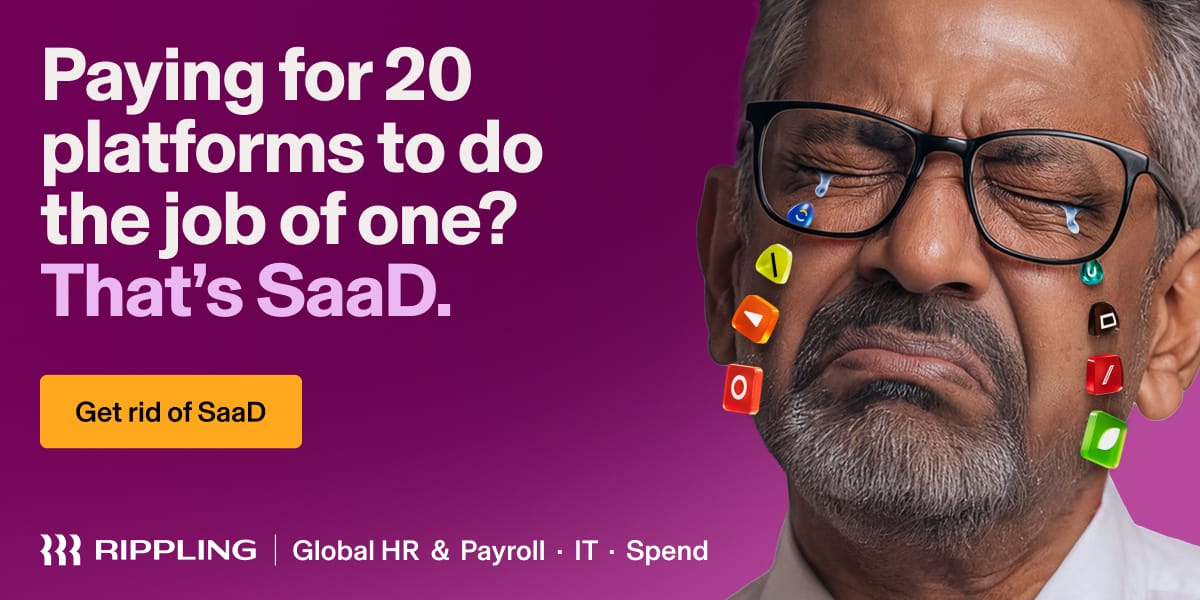Beyond the Horizon: Mastering Change, Information, and AI’s Hidden Potential
The Quiet Power of Letting Go
In times of transition—whether stepping into a leadership role, managing complex teams, or adapting to transformative technologies—the first challenge isn’t learning new skills. It’s letting go of habits that no longer serve you.
You may have built your career on focus, mastery, and rapid results. Those skills brought success. But as responsibilities scale, the formula changes: the work that once defined you now becomes something you enable others to do. You move from creating to orchestrating, from output to influence.
Don’t get SaaD. Get Rippling.
Remember when software made business simpler?
Today, the average company runs 100+ apps—each with its own logins, data, and headaches. HR can’t find employee info. IT fights security blind spots. Finance reconciles numbers instead of planning growth.
Our State of Software Sprawl report reveals the true cost of “Software as a Disservice” (SaaD)—and how much time, money, and sanity it’s draining from your teams.
The future of work is unified. Don’t get SaaD. Get Rippling.
Consider what this requires:
Releasing hands-on creation: Building products directly gives way to guiding multiple initiatives. Your impact now multiplies through your team rather than your own work alone.
Surrendering uninterrupted focus: Deep work will shrink into short bursts. Meetings, fires, and human interactions become your new reality—but you gain the power to protect your team’s focus.
Embracing delayed feedback: Results manifest slowly. Patience and pattern recognition replace instant gratification.
Facing conflict proactively: Avoiding tough conversations is no longer an option. Early, candid feedback prevents minor issues from becoming crises.
Expanding vision: Short-term thinking must evolve into long-term strategy, resource planning, and horizon scanning.
Tip: Audit your daily routines. Identify what habits yield diminishing returns in your new context, and consciously let them go. The space you free is where real growth occurs.

Navigating the Currents of Information
Success isn’t just about doing—it’s about seeing and sharing what matters. This means mastering the flow of information vertically and horizontally: upward to leadership, downward to your team, and sideways to peers.
Information flows in three pillars:
People: Unexpected changes, performance shifts, milestones, or even casual references to HR/legal issues signal deeper dynamics.
Projects: Early observations—good or bad—enable timely decision-making. “Impending doom” is often subtle: a hint of trouble, a missed milestone, or unusual behaviors.
Politics: Gossip, rumors, and shifts in team interactions reveal incentives, pressure points, and opportunities. Even if information seems false or trivial, ignoring it leaves you blind to patterns that matter.
Half of what you need comes from above; half from your peers. Focusing only on “managing up” ignores critical lateral insights. The professionals who excel are those who collect, validate, and transmit information consistently, turning scattered signals into actionable awareness.
Tip: Maintain a “pulse log” of critical developments across projects, people, and politics. Brief daily notes ensure nothing falls through the cracks and sharpen your situational awareness.
Find out why 100K+ engineers read The Code twice a week.
That engineer who always knows what's next? This is their secret.
Here's how you can get ahead too:
Sign up for The Code - tech newsletter read by 100K+ engineers
Get latest tech news, top research papers & resources
Become 10X more valuable
The Invisible Revolution of Gen AI
Transformative technologies follow a predictable arc: decades of incremental change, then sudden acceleration. Gen AI is in the early phase: it’s replacing old tools, not yet reorganizing work itself.
Compound growth is invisible: Neural networks progressed quietly for 70 years, then ChatGPT reached 100 million users faster than any previous product. Improvements compound exponentially but often remain invisible until they dominate everything.
We’re still “replacing steam engines”: Using Gen AI to write emails faster is akin to using electricity in the 1890s without reorganizing factories. Real disruption comes when processes and workflows are redesigned around the technology.
Uncertainty breeds anxiety: Nobody knows the full scope of AI’s impact. The most important applications will be unexpected, emerging from novel combinations rather than predictions.
Stories shape adoption: Compelling narratives—whether about doom, boom, or co-intelligence—drive behavior more than technical accuracy. The story you believe shapes the choices you make.
Tip: Focus on adaptive capacity rather than prediction. Learn to critically evaluate AI outputs, understand the incentives driving adoption, and cultivate “meta-skills” such as learning how to learn and synthesizing knowledge across domains.
From Boring to Brilliant: Training Videos Made Simple
Say goodbye to dense, static documents. And say hello to captivating how-to videos for your team using Guidde.
1️⃣ Create in Minutes: Simplify complex tasks into step-by-step guides using AI.
2️⃣ Real-Time Updates: Keep training content fresh and accurate with instant revisions.
3️⃣ Global Accessibility: Share guides in any language effortlessly.
Make training more impactful and inclusive today.
The best part? The browser extension is 100% free.
Reimagining Work and Expectations
The transformative potential of Gen AI isn’t in faster execution—it’s in rethinking why and how work exists.
Agentic AI is early: Chaining multiple AI tasks reliably is mathematically complex; current models are impressive but far from flawless.
Critical thinking remains essential: Blindly following AI outputs can reduce performance. The advantage goes to those who use AI to augment judgment rather than replace it.
Expectations vs. reality: High hype inflates perceptions of progress. Productivity gains are real but localized; broad transformation takes time. Think long-term, not quarterly headlines.
Look for opportunities to question whether existing workflows are necessary at all. For instance, imagine AI automating complex, repetitive coordination—suddenly the structure of banking, research, or knowledge work may no longer resemble today’s patterns.
Tip: Audit workflows in your domain. Ask: “Which processes exist out of habit rather than necessity?” Use AI to test whether some steps can be eliminated or redesigned.
Why You Should Cancel Your Car Insurance

You could be wasting hundreds every year on overpriced insurance. The experts at FinanceBuzz believe they can help. If your rate went up in the last 12 months, check out this new tool from FinanceBuzz to see if you’re overpaying in just a few clicks! They match drivers with companies reporting savings of $600 or more per year when switching! Plus, once you use it, you’ll always have access to the lowest rates; best yet, it’s free. Answer a few easy questions to see how much you could be saving.
Learn More
Patterns of Human Adaptation
The final insight spans both leadership and technology: human behavior remains predictable, even amidst disruption.
Incentives shape adoption: People and organizations embrace tools that make them appear more effective or reduce effort.
Stories influence perception: Compelling narratives, not raw data, drive widespread adoption.
Compound effects create sudden shifts: Decades of incremental progress appear invisible until they restructure everything overnight.
Those who thrive are not necessarily the ones who predict the future—they are the ones who understand the timeless patterns of adaptation, and position themselves to act when the invisible becomes obvious.
Tip: Combine the principles:
Let go of obsolete habits to make space for new priorities.
Master the flow of information across all directions.
Use AI and other transformative tools to question fundamental assumptions, not just to do old tasks faster.
Maintain patience and perspective: the real revolution is gradual, invisible, and inevitable.
The question isn’t what will change—it’s how you will reorganize your work, focus, and awareness around the opportunities that change enables.
What’s your next spark? A new platform engineering skill? A bold pitch? A team ready to rise? Share your ideas or challenges at Tiny Big Spark. Let’s build your pyramid—together.
That’s it!
Keep innovating and stay inspired!
If you think your colleagues and friends would find this content valuable, we’d love it if you shared our newsletter with them!
PROMO CONTENT
Can email newsletters make money?
With the world becoming increasingly digital, this question will be on the minds of millions of people looking for new income streams in 2025.
The answer is—Absolutely!
That’s it for this episode!
Thank you for taking the time to read today’s email! Your support allows me to send out this newsletter for free every day.
What do you think for today’s episode? Please provide your feedback in the poll below.
How would you rate today's newsletter?
Share the newsletter with your friends and colleagues if you find it valuable.
Disclaimer: The "Tiny Big Spark" newsletter is for informational and educational purposes only, not a substitute for professional advice, including financial, legal, medical, or technical. We strive for accuracy but make no guarantees about the completeness or reliability of the information provided. Any reliance on this information is at your own risk. The views expressed are those of the authors and do not reflect any organization's official position. This newsletter may link to external sites we don't control; we do not endorse their content. We are not liable for any losses or damages from using this information.




